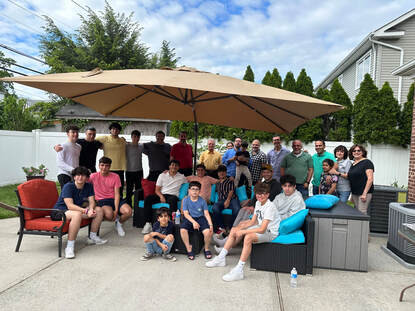
During the 1989-1990 academic year, when I was in sixth grade, The Hamazkayin of my hometown, Kessab, presented The Golden Rooster, a novel by renowned Armenian writer Raffi, as a theatrical performance. On the day of the premiere, Hamazkayin decided to have a matinee performance for the students of the Armenian schools in town. The plan was for every student who wanted to attend to get off the school bus at Sahagian Hall of St. Mary’s Armenian Apostolic church. My brother Hagop, a third grader, and I were excited because my dad was playing the lead role. My mother had packed lunch for us to eat before the performance. To avoid taking our school bags to the performance, I asked Uncle Vahag, the school bus driver, who was also my aunt’s husband, to give our school bags to my mom. I remember the sinking feeling in my stomach when I saw the school bus driving away, realizing I had left our lunch in my school bag. I had to act like a big brother and tell Hagop that we would skip lunch and wait to go home after the performance to have dinner. To my surprise, Hagop didn’t cry and was okay with the situation. We went to the hall, sat down, and waited for the performance to start. As we waited, the side door of the hall opened, and I saw Der Aram, our pastor, walking in. He looked at me and my brother and asked us to go with him. There was a dead silence in the hall as everyone probably thought we were in trouble. As we stepped outside, Der Hayr took us to a private corner in the churchyard, gave us a sandwich each, and said, "This is a little something for you, and when you finish, you may go back to watch the performance." He gave us mortadella sandwiches with cucumber on the side. I am not sure why they tasted so delicious. Maybe we were starving, and these sandwiches were so unexpected. When we went home that evening, my mom asked us what we had done for lunch. We said that Der Hayr gave us sandwiches. My mom was surprised and got on the phone and thanked Der Hayr for caring for us. We later learned that when my mom found the lunch that she had packed for us in my school bag, she thought that the best way to communicate with us was to call the church office and ask Der Hayr to convey a message for us to go and buy something from a nearby store and not worry about paying and that she would pay later. When Der Hayr learned about our story, he decided not to follow my mom’s instructions but to take care of us himself.
I have been deeply impacted by this story, which I have personally experienced. When I was a child, I felt loved and cared for by my pastor at that time. As a pastor now, I believe that what Der Aram Kelengian of blessed memory did was nothing short of impeccable pastoral care. This experience carries important Biblical undertones. On the one hand, it reflects the charity aspect of our spiritual life that Christ teaches in the Gospel according to Matthew: “For I was hungry and you gave me something to eat, I was thirsty and you gave me something to drink, I was a stranger and you invited me in, I needed clothes and you clothed me, I was sick and you looked after me, I was in prison and you came to visit me.” (Mt. 25:35-36). On the other hand, it reflects the fellowship aspect that Jesus introduced and implemented throughout his ministry by sharing meals with people on almost every occasion, culminating in the Last Supper, where Jesus gives Himself to us as our spiritual nourishment.
These thoughts went through my mind when my wife Annie suggested we invite the Altar servers of St. Sarkis church to our home last Sunday. It was a casual and fun-filled afternoon, and I chose to be the grill master of the day. I wanted to show love to our dedicated Altar servers, the same paternal love that I had once received from my pastor, but most importantly, the love that Christ shows to us when He brings us together in worship and fellowship and sustains us through His Word and the Sacrament of the Holy Eucharist.
Our Christian faith is a story in which God plays a significant role when we invite Him into our lives. In the remote town of Kessab in the early 1990s, God showed me His love through my Der Hayr's generous act. I pray that we will allow God to touch our lives and make us His instruments to carry His message of love to the world.

The Word of God
The Gospel reading today depicts Christ’s rejection in His hometown, Nazareth, as people from His hometown conspire to hurl him off the cliff (Luke 4:25-30). The Orthodox Study Bible suggests that this rejection “fulfills the rejection of the OT prophets such as Elijah and Elisha, and foreshadows His rejection by the whole Jewish nation at His trial before Pilate. Christ accepts death according to the Father's will, not at the will of the Jews. Here, the hour of His Passion has not yet come”. (Copyright © 2008 by St. Athanasius Academy of Orthodox Theology).
Prayerfully,
![]()
